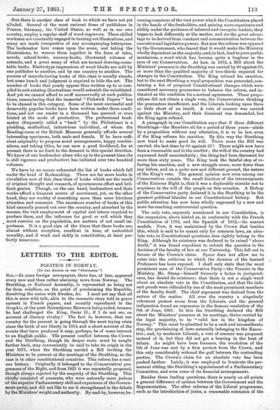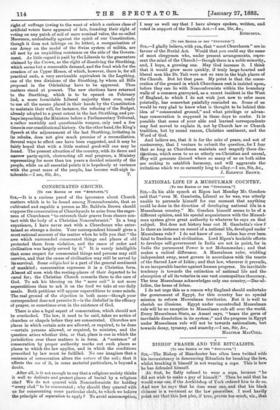LETTERS TO THE EDITOR.
POLITICS IN NORWAY.
[To THE EDITOR OF THE "SPECTATOR."' Elft,—In some foreign newspapers, there has, of late, appeared every now and then rather alarming news from Norway. The Storthing, or National Assembly, is represented as being not far from rebellion, on the point of proclaiming the Republic, dissolving the union with Sweden, &c. I need not say that all this is mere wild talk, akin to the romantic story told in grave earnest in French papers, and recently reproduced in the Graphic, of the poet Bjornstjerne Bjornson being exiled, because he had challenged the King, Oscar II., if I do not err, on account of literary rivalry ! The fact is, however, that our country for the present is going through the most trying crisis since the birth of our liberty in 1814, and a short account of the events that have produced it may, perhaps, be of some interest to an English public. Tlie present conflict between the Crown and the Storthing, though its deeper roots must be sought farther back, may conveniently be said to take its origin in the year 1871, when the Storthing carried a Bill inviting the Ministers to be present at the meetings of the Storthing, as the case is in other constitutional countries. This reform has a curi- ous history. Originally it belonged to the (Conservative) pro- gramme of the Right, and from 1821 it was repeatedly proposed,
though always rejected by the majority of the Storthing. This Chiefly consisted of peasants, who were naturally more jealous of the superior Parliamentary skill and experience of the Govern- ment party, and did not like to see it strengthened in the debate by the Ministers' weight and authority. By-and-by, however, be-
comingconscious of the vast power which the Constitution placed in the hands of the freeholders, and gaining more experience and ability under the guidance of talented and energetic leaders, they began to look differently at the matter, and see the great advan- tage to be derived from constant oral communication between the executive and legislative powers. But now the reform was opposed by the Government, who feared that it would make the Ministry wholly dependent on the majority, and,in fact, lead to pure parlia- mentarism, a word which has become quite a bugbear in the eyes of our Conservatives. At last, in 1872, a Bill about the Ministers' presence in the Storthing was carried by 80 against 29, or more than the qualified majority of two-thirds required for changes in the Constitution. The King refused his sanction, but to the next Storthing a royal proposition was presented, con- taining a list of proposed Constitutional changes which were considered necessary guarantees to balance the reform, and in- timated as the condition for a mutual agreement. These propo- sitions did not obtain a single vote, the Conservatives thinking the guarantees insufficient, and the Liberals looking upon them as little short of an insult. A vote of censure was carried against the Ministry, and their dismissal was demanded, but the King again refused.
A paragraph in our Constitution says that if three different Storthings—the Members sit for a period of three years—abide by a proposition without any alteration, it is to be law, even if the King refuses his sanction. By this way the Storthing now tried to make good its will. Twice more the Bill was carried, the last time by 90 against 23! There might now have been a reasonable end to the conflict; the will of the country had expressed itself unmistakably ; the thing had been discussed for more than sixty years. The King took the fateful step of re- fusing his sanction, and a new struggle arose, more fierce than any before, and on a quite new and different ground, the nature of the King's veto. The general opinion now even among our Conservatives outside the small fraction of the iotransigeants of the Extreme Right is, that it was a deplorable mistake not to acquiesce in the will of the people on this occasion. A Bishop of the Conservative party declared it in the Storthing to be the greatest political blunder in our Constitutional history. But public attention has now been wholly engrossed by a new and more far-reaching controversial question.
The only veto, expressly mentioned, in our Constitution, is the suspensive, above hinted at, in conformity with the French Constitution of 1792, and the Spanish of 1812,—its nearest models. Now, it was maintained by the Crown that besides this, which is said to be meant only for common laws, an abso- lute veto in Constitutional questions does rightly belong to the King. Although its existence was declared to be raised "above doubt," it was found expedient to submit the question to the decision of the faculty of law at our University. This fell out in favour of the Crown's claim. Space does not allow me to enter into the criticism to which the decision of the learned Professors has been exposed. I shall only state that the most prominent man of the Conservative Party—the Premier in the Ministry, Mr. Stang—himself formerly a lector in jurisprud- ence, has denied its existence; that there is not a single word about an absolute veto in the Constitution, and that the indi- rect proofs were ridiculed by one of the most prominent members of the faculty itself. The chief argument was derived from the nature of the matter. All over the country a singularly vehement protest arose from the Liberals, and the general indignation found an expression in the famous resolution of the 9th of June, 1881. In this the Storthing declared the Bill about the Ministers' presence at its meetings, thrice carried by the legal majority, to be "valid law in the kingdom of Norway." This must be admitted to be a rash and inconsiderate step, the proclaiming of laws naturally belonging to the Execu- tive; and, by moderate Liberals, a vote of censure was proposed instead of it, but they did not get a hearing in the heat of debate. As might have been foreseen, the resolution of the 9th of Jane was met by a firm protest from the Crown, and this only considerably widened the gulf between the contending parties. The Crown's claim for an absolute veto has been pushed farther. Lately, it was employed to frustrate the per- manent sitting, the Storthing's appointment of a Parliamentary Committee, and even some of its financial arrangements.
Besides these leading questions, there is nearly on all points a general difference of opinion between the Government and the Representation. The other reforms of the Liberal programme, such as the introduction of juries, a reasonable extension of the
right of suffrage (owing to the want of which a curious class of artificial voters have appeared of late, founding their right of voting on any patch of soil of mere nominal value, the so-called Moormen, undoubtedly against the spirit of our Constitution, though it does not infringe on its letter), a reorganisation of our Army on the model of the Swiss system of militia, are all met by an unyielding resistance on the side of the Govern- ment. As little regard is paid by the Liberals to the guarantees. claimed by the Crown, as the right of dissolving the Storthing, which seems but a reasonable demand, and the fond wish for the creation of an tipper House, of which, however, there is, for all practical ends, a very serviceable equivalent in the Lagthing, one of the two divisions of the Storthing, by whom all Bills proposed in the Odelsthing have to be approved. Thus matters stand at present. The new elections have returned 'to the Storthing, which is to be opened on February 2nd, a more formidable Liberal majority than ever, ready to use all the means placed in their hands by the Constitution to maintain their will, for instance, the refusing of the Budget, already adopted to a great extent in the last Storthing, and per- haps impeaching the Ministers before a Parliamentary Tribunal, a rather unwieldy and questionable weapon, only used a few times in our constitutional history. On the other hand, the King's Speech at the adjournment of the laat Storthing, irritating in its rebuke, does not give much promise of a reconciliation. Several ways to effect one have been suggested, and it may be fairly hoped that with a little mutual good-will one may be found. The present situation of the country, with its fierce and narrow party-spirit, obstructing all real progress, a Ministry representing for more than ten years a decided minority of the people, while on all essential points it is hopelessly at variance with the great mass of the people, has become well-nigh in-







































 Previous page
Previous page